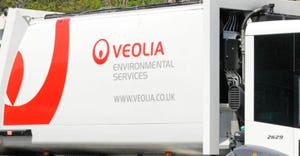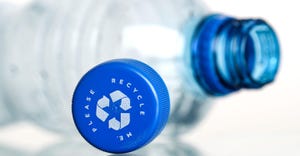Coke Isn't "It" with Recycling,
September 1, 1999
Melanie A. Lasoff
Environmental Group Challenges In the first of a series of high-profile ads, the GrassRoots Recycling Network (GRRN), Athens, Ga., has accused Atlanta-based Coca-Cola Co. of breaking a promise made nine years ago to use recycled plastic in its soda bottles.
The first ad appeared in the New York Times on August 2, and at press time, GRRN would not disclose where or when future ads would be printed.
According to the ad - and GRRN's two-year-old campaign against Coke - the world's leading soft drink company made a public commitment to use recycled polyethylene terephthalate (PET) plastic in 1990. About four years later, Coke stopped using the recycled plastic, citing added costs as a prohibitive factor. However, "new plastic recycling techniques approved by the [U.S. Food and Drug Administration, Washington, D.C.] add just a fraction of a cent per bottle. Keeping [Coca-Cola Chairman and CEO M. Douglas Ivester's] promise would cost Coke no more than the stock options he was given in 1998, or just one-half of one percent of Coke's profits," the ad states.
Bill Sheehan, GRRN coordinator, says the campaign "shines the spotlight" on the need for corporate waste accountability.
"Producer responsibility is the big thing in Europe, and it's been strongly resisted here in the United States," he says. "Coke is a good poster child for this problem of corporations not taking responsibility for their waste."
In April 1997, GRRN began its campaign by writing a letter to then-CEO Roberto Goizueta, Sheehan says. The campaign then escalated to more letters, a demonstration at Coke headquarters and an Internet petition with about 20,000 signatures, he says. A Washington, D.C.-based public advocacy organization, The Florence Fund, then offered to pay for and place ads in national media, including the New York Times.
GRRN's actions have led several local governments - such as West Hollywood, Calif.; Gainesville, Fla.; and Winona County, Minn. - to pass resolutions endorsing its campaign. More than 80 environmental organizations also have spearheaded a "Take it Back" movement, in which consumers mail their empty PET bottles back to Coke. Sheehan could not estimate how many bottles had been mailed so far. Working Assets, a San Francisco-based long distance company, also has generated 8,000 letters and approximately 700 e-mails to Coke demanding the company recycle its PET bottles, he says.
"Until we came along, people weren't even aware Coke wasn't using recycled plastic," Sheehan says. "Coke says they are not using recycled plastic because it costs too much, but it's the taxpayers who are paying. We're subsidizing Coke's profit."
Coke spokesperson Bill Hensel says that while Coke did drop PET recycling due to costs, it has been test marketing two technologies during the past year and is waiting for approval from the U.S. Food and Drug Administration (FDA), Washington, D.C., on two other recycling applications.
"We're acting responsibly and are helping to promote the right uses for our packages," Hensel says. "Promoting increased participation in an already-established recycling infrastructure is much more productive than campaigns limiting recycling to one material into one particular application."
He cites a 1997 study by the U.S. Environmental Protection Agency (EPA), Washington, D.C., that states soft drink containers are less than 1 percent of the waste stream in the United States, and 58.7 percent of all soft drink containers in general are recycled.
And because costs for recycled PET bottles have risen, Hensel says Coke is examining other EPA-approved end-uses for its materials, including shipping containers and uniforms. The company also has decreased the overall amount of plastic, glass and aluminum used in most of its beverage containers, he says.
"Keeping our costs down is one of the things we pay attention to all the time," Hensel says. "To price competitively, you must keep all your costs down. Clearly, it's all part of the equation."
Hensel says GRRN's campaign has increased the amount of mail and e-mail the company regularly receives from consumers, but he does not know by how much.
GRRN says it will continue to pressure Coke until the company starts using recycled PET bottles again, especially since Coke does use recycled plastic bottles in other countries, Sheehan says. Overall, he claims that recycling the material will make Coke more money. " When you buy a Coke, you buy an image [of] the warm, fuzzy, green corporate citizen," he says. "It's an image they must have [to succeed]. If you take that away, all they have is sugar water."
You May Also Like


